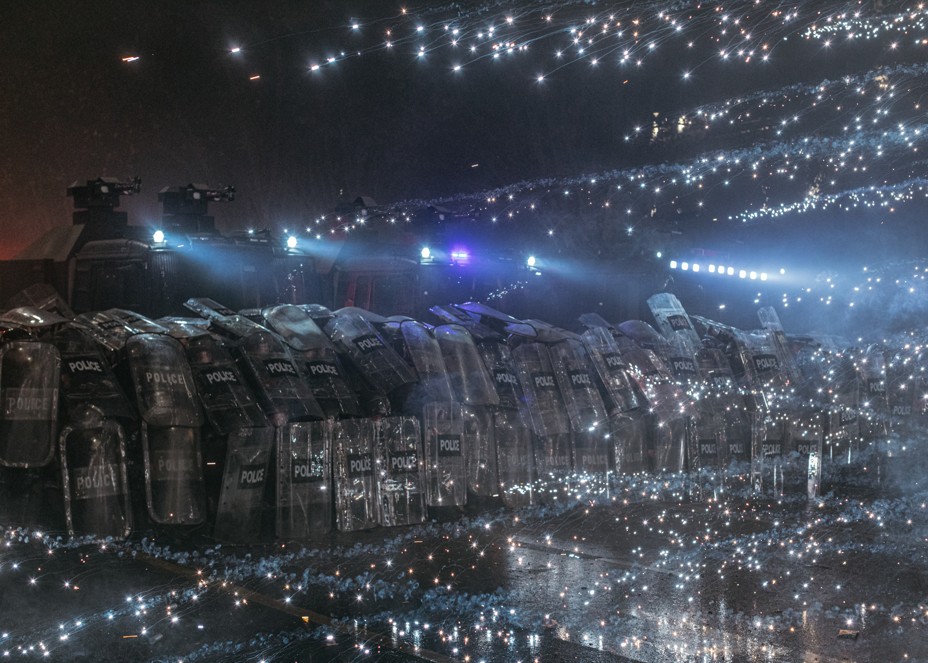Europe Could Be Losing Another Democracy to Putin
Protesters in Georgia are trying to stem Russia’s growing influence in Eastern Europe.

For months, thousands of protesters have marched through Tbilisi, Georgia, confronting masked police who have beaten and arrested hundreds. The demonstrations took off in November, when the ruling party halted talks to join the European Union. Georgians fear that their government is sidling up to Moscow and transforming the country into an authoritarian state.
The crisis threatens to overturn a decades-long effort by the United States and EU to preserve Georgian democracy, which has served as a bulwark against the Kremlin’s growing influence in the Black Sea region. Now the protesters stand between Vladimir Putin and a political victory that could accelerate his imperialist campaign throughout Eastern Europe.
Since gaining independence from the Soviet Union in 1991, Georgia has received more than $10 billion in development aid from the West, much of it bolstering the country’s democratic institutions. But Georgia’s path to democracy has never been straight. Abuses of power and electoral disputes have repeatedly undermined progress. Contested elections in October gave the Georgian Dream party commanding control of Parliament. By suspending talks to join the EU, the party quashed a goal that an overwhelming majority of Georgians supported. Protesters worry that the country’s current autocratic turn may become irreversible.
[Read: A wider war has already started in Europe]
Georgian Dream emerged in 2012 during a period of political turmoil. Bidzina Ivanishvili, an oligarch who had amassed his fortune in Russia, invested his considerable resources in establishing a political party to run against Georgia’s then-president, Mikheil Saakashvili, who faced allegations of corruption and political violence. He served as prime minister for a year and appointed his business associates to leadership positions. His party has remained in power ever since, steadily accruing control over the country’s judiciary, electoral commission, state broadcaster, and other TV stations. Today, Ivanishvili’s estimated wealth amounts to more than one-quarter of Georgia’s GDP. Georgian Dream’s ascent resembles those of other so-called hybrid regimes, which use the tools of democracy to subvert civic institutions and curtail freedoms while evading accountability.
Until recently, Georgian Dream backed EU accession. Along with opposition parties, it enshrined the goal in the constitution, and a year ago, the EU formalized Georgia as a candidate for membership. But in 2021, the party refused to adopt EU-mediated reforms that would have ensured judicial independence and other basic norms of democratic power-sharing. After Moscow’s full-scale invasion of Ukraine, Georgian Dream took a more explicitly anti-Western turn, adopting nationalist language that echoed Putin’s and playing up the threat of an unspecified “Global War Party” that aimed to drag Georgia into “a second front” against Russia. In May, it passed a law that designated Western-funded NGOs as “foreign agents” and imposed intrusive reporting requirements that many Georgians sense could wipe out the civic sector.
Five months later, Georgian Dream won 54 percent of the vote in parliamentary elections that observers have widely criticized. Exit polls suggested that the party had less support than the official results indicated, by a margin of 10 or more points. Demonstrations erupted in Tbilisi and haven’t stopped since.
Georgian protesters voice worries that their country might become a Russian vassal, like Belarus. Russian funds have poured into the country, particularly since the full-scale war in Ukraine and subsequent sanctions on Russia. The opposition leader Giorgi Gakharia, a former Georgian Dream prime minister, has accused the government of fostering a “grey zone” to help Russia, Iran, and China facilitate illicit trade and sidestep regulators. “With the Ukraine war, Russia needs ways to avoid sanctions,” he told me, “and the South Caucasus is ideal for this.” (Shortly after we met, two senior Georgian Dream officials, including an MP, physically attacked Gakharia, inflicting a concussion and a broken nose.)
The Kremlin already holds nearly 20 percent of Georgian territory, which it secured through a war in 2008, and is pushing to develop a new port in Russian-controlled Abkhazia. During the election campaign, Georgian Dream raised the idea of reintegrating these regions, which would be virtually impossible without close alignment with Russia. Some Georgians fear that a potential peace settlement in Ukraine might grant Russia greater influence in their country in exchange for Western security guarantees for Ukraine.
[Read: Trump is facing a catastrophic defeat in Ukraine]
A Kremlin-aligned Georgia would undermine the Eastern Partnership, an EU initiative that aims to spread democracy in the Black Sea region and strengthen its political, economic, and military relations with Europe. Of the six states involved in the initiative, Moscow has dominated Belarus, allied with Azerbaijan, invaded Ukraine, and interfered in a recent election in Moldova. If Georgia succumbs to the Kremlin, that leaves only Armenia, whose potential bid to join the EU will be severely complicated by the Russian influence that surrounds it.
The EU has condemned Georgia’s October election and withdrawn visa-free travel for party elites. It has also suspended aid, including 30 million euros it earlier committed for military reform. And the U.S. has imposed sanctions on key figures within the Georgian government, including Ivanishvili. But Georgia’s would-be autocrats appear to be undaunted. So far, police have avoided charges for beating demonstrators, while cultural figures and protesters face long prison sentences for minor infractions.
Many in the Georgian opposition, and some abroad, now look to outgoing President Salome Zourabichvili for leadership. To keep the opposition united and sustain the support of Western allies will require considerable diplomatic skill. Zourabichvili spent inauguration week in Washington to make her case to the new administration.
The nights in Tbilisi were already very cold when I visited in December. Now they are freezing. Still the streets are dense with protesters, and they are determined to stay.
“Georgian Dream has taken over everything, but all Georgians are gathering here,” one young demonstrator told me. “We will be here until the end.”










